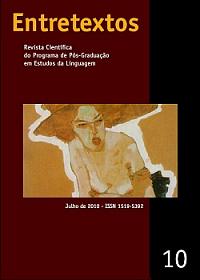The argumentative chronicle gender and the construction of its learning by students: the practice of the teacher and the Portuguese language manual
DOI:
https://doi.org/10.5433/1519-5392.2010v10n1p219Keywords:
Mother Language teaching/learning, Argumentation, Portuguese language manual, Written text productionAbstract
In this text, we present a reflection concerning how Portuguese Language manuals - PLM - and teachers develop written text production activities of an "argumentative chronicle" in a classroom of the 8th year of a public school. The motivating question is: how the "argumentative chronicle" is worked in the activities of written production of a PLM and how the teacher transmits this work to the pupils? To answer it, we present a study based on the methodological procedures of Applied Linguistics (AL) with an interpretive base, focusing on the process of language use. The corpus for analysis is constituted by the proposal of written production presented by the Portuguese PLM "Português - Linguagens", by classes in which the teacher developed the activities related to this production proposal and by the pupils' texts. The main theoretical base is Perelman & Olbrechts-Tyteca ([1958] 2005), Toulmin ([1958] 2006), and Schneuwly (1988). With data analysis, we perceived that the students can, in general, produce written argumentative texts, leading to them reflections of extra-school knowledge on their production, considering stylistic and thematic marks found in the texts, not taught by the LDP or the teacher.Downloads
References
BAKHTIN, Mikhail. Os gêneros do discurso. In BAKHTIN, Mikhail. Estética da criação verbal. São Paulo: Martins Fontes, 1979. p. 277-326.
CEREJA, William Roberto; MAGALHÃES, Thereza Cochar. Português - linguagens: 5ª à 8ª séries. São Paulo: Atual, 2002.
DOLZ, Joaquim; SCHNEUWLY, Bernard. Gêneros e progressão em expressão oral e escrita: elementos para reflexões sobre uma experiência suíça (francófona). In: SCHNEUWLY, B., DOLZ, J. et al. Gêneros orais e escritos na escola. Campinas: Mercado de Letras, 2004, p. 41-70.
FRANCHI, Eglê. E as crianças eram difíceis... A redação na escola. São Paulo: Martins Fontes, 2002.
GAVAZZI, Sigrid; GUIMARÃES, Cristiane O ensino da argumentação nas aulas de língua portuguesa: três propostas de trabalho. In: PAULIUKONIS, Maria Aparecida Lino; SANTOS, Leonor Werneck dos. Estratégias de leitura: texto e ensino. Rio de Janeiro: Lucerna, 2006. p. 93-103.
LEAL, Telma Ferraz; MORAIS, Artur Gomes de. A argumentação em textos escritos: a criança e a escola. Belo Horizonte: Autêntica, 2006.
PEDROSA, Maria Cristina Necho Salta. As atividades de produção textual escrita em livros didáticos de português: caminhos e descaminhos na formação de produtores de textos. 2006. 230 f. Dissertação (Mestre) - Pontifícia Universidade Católica de São Paulo, São Paulo/SP, 2006.
PERELMAN, Chaïm; OLBRECHTS-TYTECA, Lucie. Tratado da argumentação: a nova retórica. São Paulo: Martins Fontes, 2005.
SOARES, Magda. Linguagem e escola: uma perspectiva social. São Paulo: Ática, 1986.
SOUZA, Edna Guedes de. Dissertação: gênero ou tipo textual? In: DIONÍSIO, Ângela Paiva; BESERRA, Normanda da Silva (org.) Tecendo textos, construindo experiências. Rio de Janeiro: Lucerna, 2007. p. 163-183.
TOULMIN, Stephen Edelston. Os usos do argumento. São Paulo: Martins Fontes, 2006.
VAN DIJK, Teun. A.; KINTSCH, Walter Strategies of discourse comprehension. Nova Iorque: Academic Press, 1983.
VYGOTSKY, Levy. A formação social da mente: o desenvolvimento dos processos superiores. São Paulo: Martins Fontes, 1988.
VYGOTSKY, Levy. Pensamento e linguagem. São Paulo: Martins Fontes, 2003.
Downloads
Published
How to Cite
Issue
Section
License
Copyright (c) 2010 Entretextos

This work is licensed under a Creative Commons Attribution 4.0 International License.
Entretextos adota a Licença Creative Commons Attribution 4.0 International, portanto, os direitos autorais relativos aos artigos publicados são do/s autor/es.
Sob essa licença é possível: Compartilhar - copiar e redistribuir o material em qualquer suporte ou formato. Adaptar - remixar, transformar, e criar a partir do material, atribuindo o devido crédito e prover um link para a licença e indicar se mudanças foram feitas.























